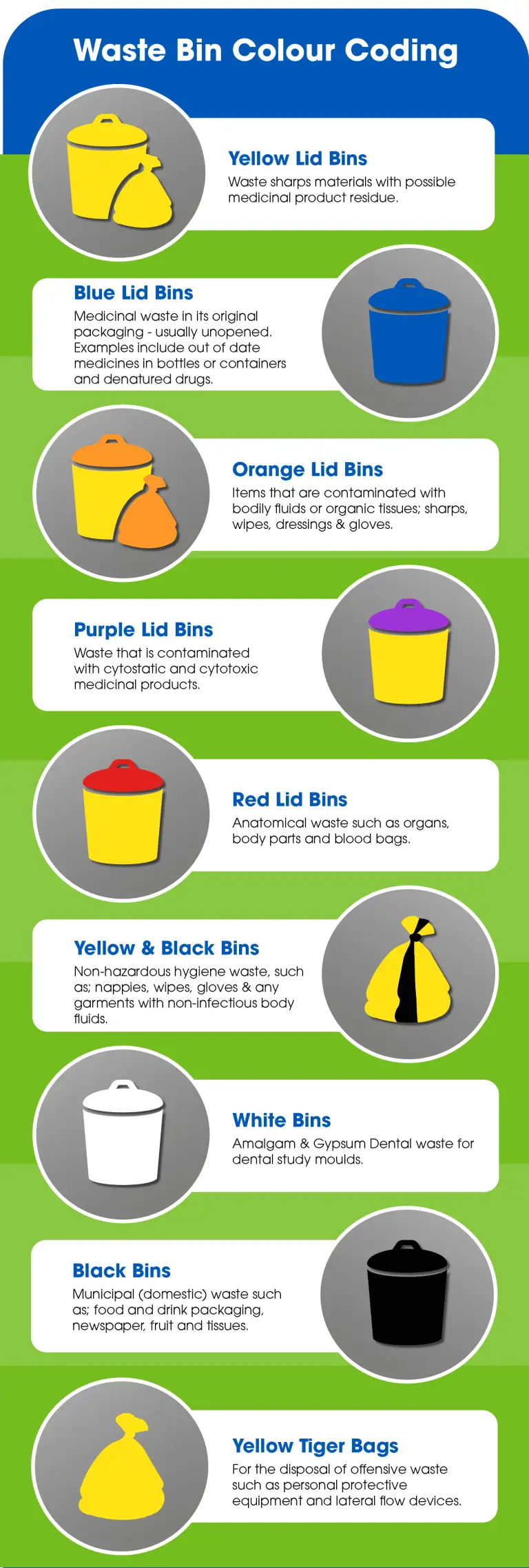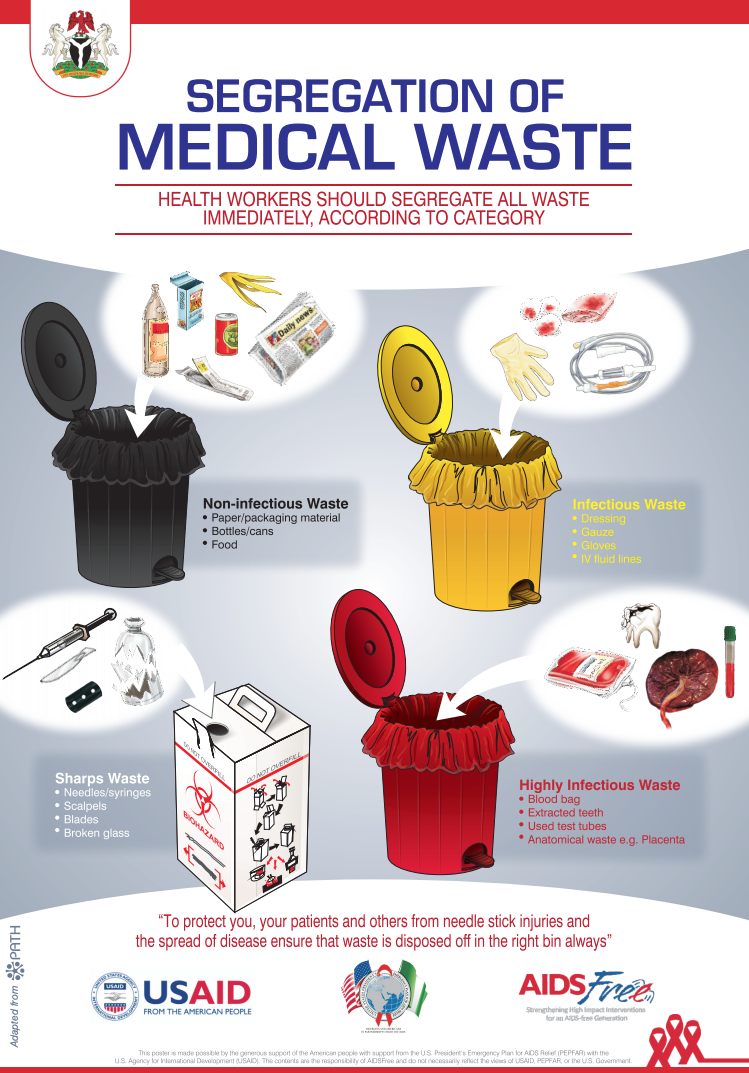Your Ally in Medical Waste Removal: Expert Service with Environmental Care
Wiki Article
Proper Disposal Methods for Clinical Waste
Correct disposal methods for medical waste are of utmost significance in guaranteeing the security of both medical care employees and the public. The proper handling and disposal of medical waste is important to stop the spread of infectious conditions and the contamination of the setting. This consists of the safe disposal of sharps, contagious waste, and pharmaceutical waste. Complying with rigorous standards established by regulative bodies is crucial to preserve conformity with lawful laws and safeguard public wellness. This introduction will certainly explore the importance of proper medical garbage disposal, supply standards for taking care of various types of waste, and emphasize the demand for healthcare centers to take on finest methods. By adhering to these standards, medical care suppliers can add to a more secure and healthier atmosphere for all.Value of Appropriate Clinical Garbage Disposal
Appropriate clinical garbage disposal is of utmost relevance in order to avoid the spread of infections and secure public health. Medical waste describes any type of waste generated throughout clinical treatments or from the health care industry. This waste can consist of infectious products, such as blood or bodily liquids, sharps, drugs, and other possibly dangerous substances. If not gotten rid of properly, clinical waste can posture major risks to health care employees, individuals, and the public.Among the main reasons for correct medical waste disposal is to prevent the spread of infections. Clinical waste can harbor different pathogens, including microorganisms, viruses, and other microbes that can trigger illness. Improper disposal can lead to the contamination of surface areas, water resources, and air, increasing the threat of infections. By safely throwing away clinical waste, the opportunities of exposure to these virus are significantly decreased, ensuring the security of health care employees, individuals, and the neighborhood at huge.
In addition, proper clinical waste disposal is essential for protecting public wellness. By adhering to appropriate disposal strategies, such as partition, therapy, and control, we can lessen the potential threats linked with clinical waste and guard the wellness of the area.
Handling and Disposing of Sharps
When it concerns the handling and disposal of sharps, adherence to appropriate protocols is vital for ensuring the safety of medical care employees and protecting against the danger of injury or infection. Sharps consist of needles, syringes, lancets, and other items with the prospective to penetrate or reduce the skin. Because of their potential to send bloodborne microorganisms, such as HIV and liver disease B and C, it is important to manage and get rid of of sharps appropriately.
Disposal of sharps containers need to follow neighborhood guidelines and guidelines (WasteX Medical Waste Disposal). It is necessary to never summarize needles or bend, break, or remove needles from syringes. As soon as the container is full, it ought to be firmly secured and taken care of according to neighborhood laws. It is best to use licensed medical garbage disposal services that specialize in the appropriate handling and disposal of sharps to make sure conformity with laws and lessen dangers to medical care workers and the setting.
Guidelines for Contagious Waste Disposal
Transmittable waste, likewise understood as biohazardous or biomedical waste, refers to products that are potentially infected with transmittable agents or various other hazardous substances. Proper disposal of contagious waste is important to make sure the safety and security and well-being of health care workers, clients, and the basic public.The guidelines for infectious waste disposal vary depending on the nation and neighborhood guidelines, however there are some usual practices that medical care centers must follow. All contagious waste ought to be set apart from other types of waste at the point of generation. Transmittable waste ought to be transferred and disposed of by licensed waste management firms that specialize in managing biomedical waste.
It is essential for medical care facilities to have extensive training find more programs in place to enlighten team on the proper procedures for infectious waste disposal. This includes training on waste partition, storage, and taking care of techniques. By adhering to these standards, health care centers can efficiently take care of transmittable waste, minimize the risk of infections, and safeguard public health.
Best Practices for Drug Waste Disposal
Pharmaceutical garbage disposal should constantly be performed on a regular basis and according to professional standards. Correct monitoring of pharmaceutical waste is vital to shield public health and the environment. Pharmaceuticals can present a substantial risk otherwise dealt with appropriately, as they might infect water resources, harm marine life, or also add to the development of antibiotic resistance.One of the very best methods for pharmaceutical waste disposal is to develop an assigned collection system within healthcare facilities. medical waste removal service. This system must consist of separate containers for various sorts of pharmaceutical waste, such as expired medicines, extra medications, and contaminated products. These containers need to be plainly labeled and found in conveniently accessible locations to motivate correct disposal by healthcare specialists
In addition, it is important to educate medical care personnel regarding the proper handling and disposal of pharmaceutical waste. Educating programs should concentrate on recognizing various types of pharmaceutical waste, comprehending the associated risks, and following the proper disposal procedures. Normal suggestions and updates should be supplied to guarantee conformity with disposal standards.
In addition to inner methods, medical care facilities need to additionally establish partnerships with accredited waste management companies. These business focus on the collection, transport, and disposal of pharmaceutical waste. By working with these experts, healthcare centers can guarantee that their pharmaceutical waste is gotten rid of securely and in conformity with local regulations.
Compliance With Legal Regulations
In order to ensure conformity with legal regulations, it is critical for health care facilities to adhere to proper disposal methods for medical waste. Medical waste presents a considerable threat to public wellness and the environment, making it important for medical care facilities to dispose and take care of of it according to the legislation.
Regulative bodies, such as the Occupational Safety and Health And Wellness Management (OSHA) and the Environmental Protection Company (EPA), have established guidelines and requirements for the appropriate disposal of medical waste - WasteX Medical Waste Disposal. These regulations intend to safeguard health care employees, waste administration workers, and the basic public from potential hazards connected with clinical waste

Non-compliance with lawful laws can cause serious consequences for medical care centers, including fines, lawful liabilities, damage to credibility, and possible harm to public wellness. As a result, it is important for healthcare facilities to stay current with the most up to date regulations and continually monitor and improve their waste monitoring techniques.
Conclusion
In verdict, correct disposal strategies for medical waste are vital to make certain the safety and security of healthcare employees, people, and the atmosphere. Adhering to guidelines for getting rid of and handling of sharps, infectious waste, and pharmaceutical waste is necessary. Conformity with lawful policies is essential to stop the spread of infections and protect public health. It is imperative that medical care facilities keep strict protocols for the appropriate disposal of medical waste to decrease threats and maintain a secure health care environment.Medical waste refers to any waste generated during clinical treatments or from the medical care sector. Contagious waste, also recognized as biohazardous or biomedical waste, refers to products that are possibly infected with transmittable agents or various other unsafe materials. All transmittable waste should be set apart from other types of waste at the factor of generation. Transmittable waste must be moved and disposed of by certified waste monitoring business that specialize in dealing with biomedical waste.
Sticking to guidelines for disposing and taking care of of sharps, infectious waste, and pharmaceutical waste is vital. (medical waste removal service)
Report this wiki page